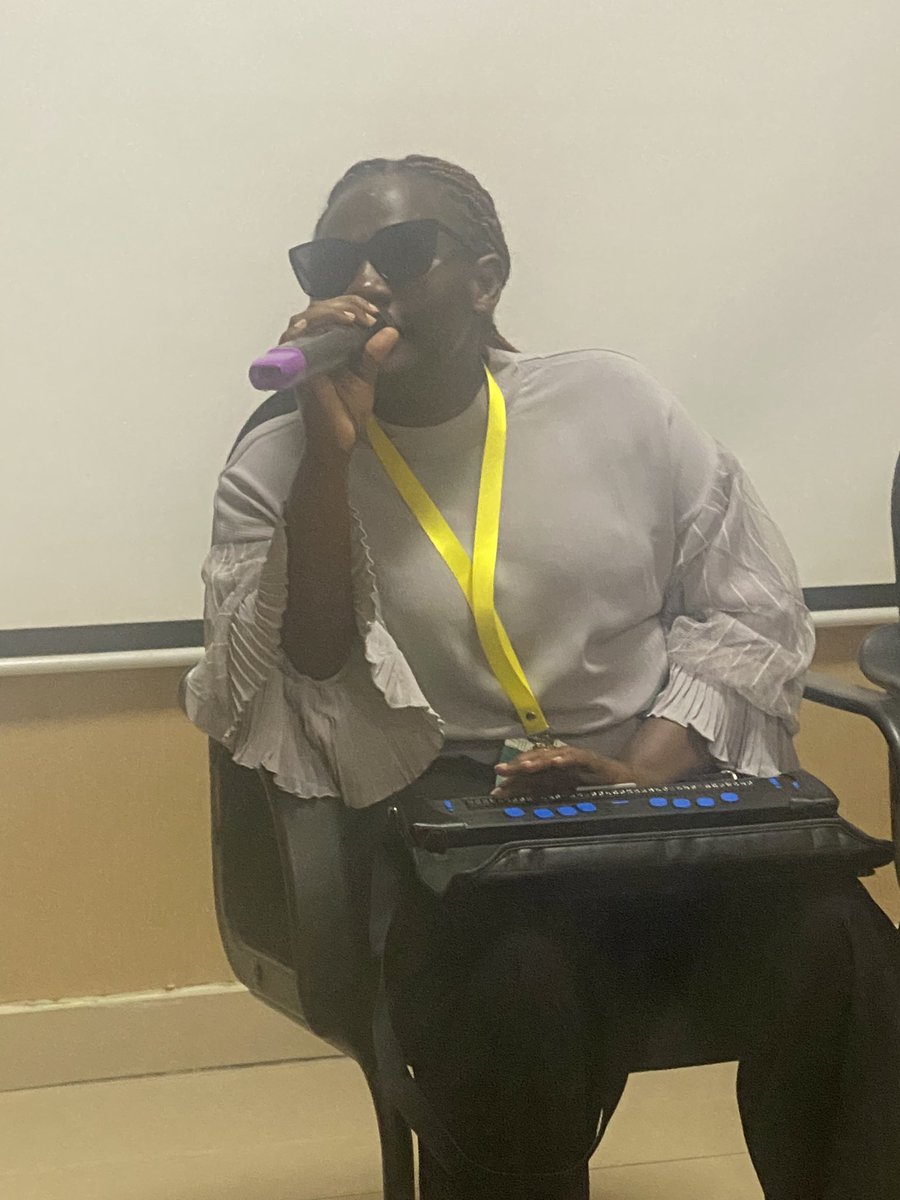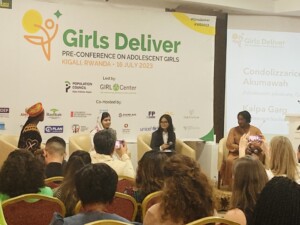
Her remarks cut through the room. Anisie was sharing her harrowing experience of invisibility, exclusion, and violence as a person with disabilities. Her words demanded attention, and accordingly, everyone became quiet, and all smiles disappeared. You could hear a pin drop. This was in stark contrast to the mood just a few minutes earlier, where the audience was smiling, happily chatting, and clapping as the speakers were introduced. The event was the Baobab Pre-Conference Gender-Based Violence (GBV) Roundtable, co-hosted with Together for Girls on July 16 at the 2023 Women Deliver Conference in Kigali, Rwanda. Driven by evidence, and with gender equality and equity at the heart of its work, the Population Council’s GIRL Center led the first-ever Girls Deliver Pre-Conference on Adolescent Girls in partnership with 18 co-hosts. The event drew 250 participants, including practitioners, donors, activists, researchers, policymakers, and leaders of grassroots and community organizations.

From left to right: Keynote speakers at Girls Deliver – Condolizzarice Akumawah, Malala Yousufzai, Kalpa Garg, and Stacey Abrams
Following the plenary session, the Roundtable session took place. And this is where the lovely Anisie shared her experience—almost casually, one would say. As she explained, in her experience, living with a disability was almost “normal”—a reality that she became accustomed to over time. It’s a reality that she had stopped expecting solutions for or had resigned herself of expecting “others” (not least, researchers) to figure out. At this event, however, this woman opted to use her own voice to make a difference, speaking up about her lived experience and directly engaging key stakeholders at WD2023. Anisie underscored the need for stronger, louder, and welcome voices of research participants to counter the seeming unawareness of some researchers.
The Baobab Roundtable event at Girls Deliver presented a unique opportunity for Anisie and other girls to share their thoughts with a global audience. It aimed to share, distill, and discuss strategies and explore concrete examples and opportunities for using national-level data on GBV and intersecting issues (social and gender norms, vulnerabilities of specific groups) to drive advocacy to prevent and end GBV, with a focus on adolescents and youth. The actual discussion deepened understanding and challenged ideas around what constitutes “data and evidence,” explored barriers and opportunities to accessing and utilizing data and evidence for advocacy, and shared concrete examples of data/evidence-driven advocacy among both featured speakers and participants. The roundtable provided opportunities for substantive exchange and learning between adolescent and youth advocates—with a focus on girls—and activists and practitioners working in the GBV prevention and response and policy advocacy spaces.
Sitting in that room and listening to her, it was not lost on the audience that Anisie, whose noticeable “disability” was visual impairment, was talking about visibility. At one point she proceeded to ask the heartbreaking question: “Sometimes, it is difficult to access people, for example, people with disability or adolescents in hard-to-reach areas …. Do researchers even “see” me? And if they don’t “see” me, how can they bring the data to me, or [data] about me to others?”
Anisie’s hard-hitting questions demand urgent answers, and research under the Baobab Research Programme Consortium (RPC) is beginning to respond to them: Baobab recently conducted the world’s first-ever Humanitarian Violence Against Children and Youth Survey (HVACS). Implemented in all refugee settlements in Uganda, the survey results show both disproportionate levels of violence perpetrated against girls living with disabilities in refugee contexts, and interlinkages between GBV and disability. The proportion of girls experiencing any sexual violence is higher among those with disabilities than among those without disabilities (59.7% vs. 34% among females aged 13-24 years).
Additionally, HVACS data shows that girls with disabilities are more likely to experience multiple forms of GBV—sexual, physical and emotional—compared to their peers without disabilities.
At Baobab—based on the robust evidence being generated under this program—our response to Anisie is: We are paying attention to you. We notice you and other marginalized girls in humanitarian settings, particularly. Baobab will continue to generate and support the use of disaggregated data to support policy and programming, ensuring that multiple layers of vulnerability are revealed and addressed to enhance the overall sexual and reproductive health of refugee populations.
As Baobab, that is our promise. We owe it to Anisie and many other marginalized girls in humanitarian settings.
This post is part of Rooted Reflections, a special series from the Baobab Research Programme Consortium documenting reflections, experiences, and learnings that are often left uncaptured by researchers in their implementation of research studies, and by the peer-reviewed literature.
Read all posts in Rooted Reflections.
